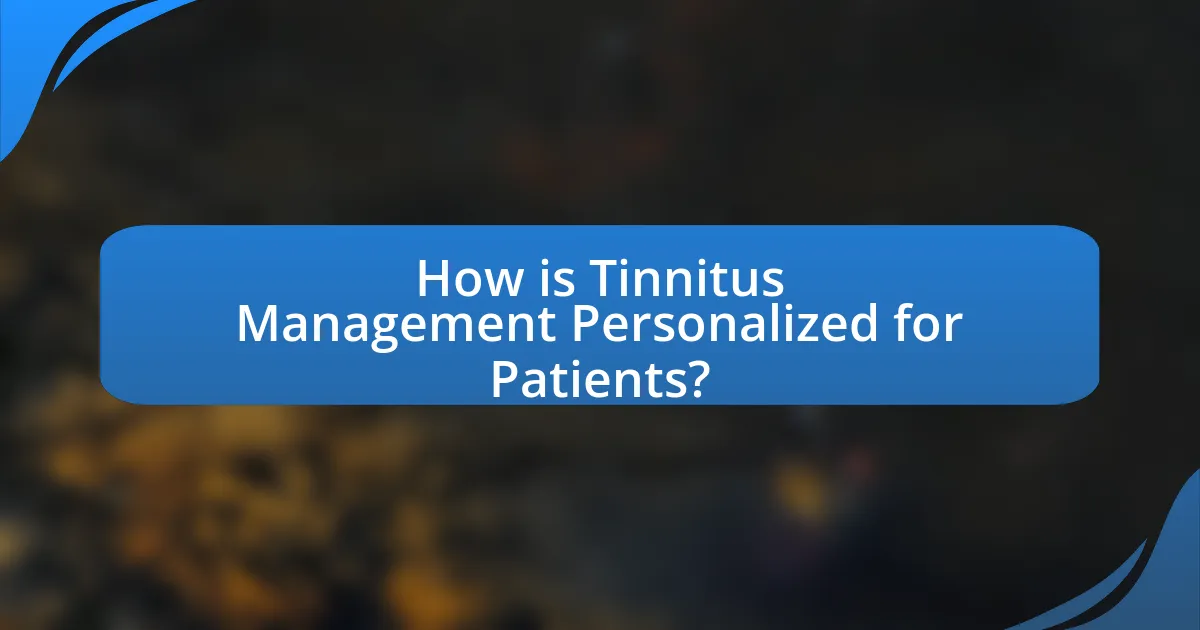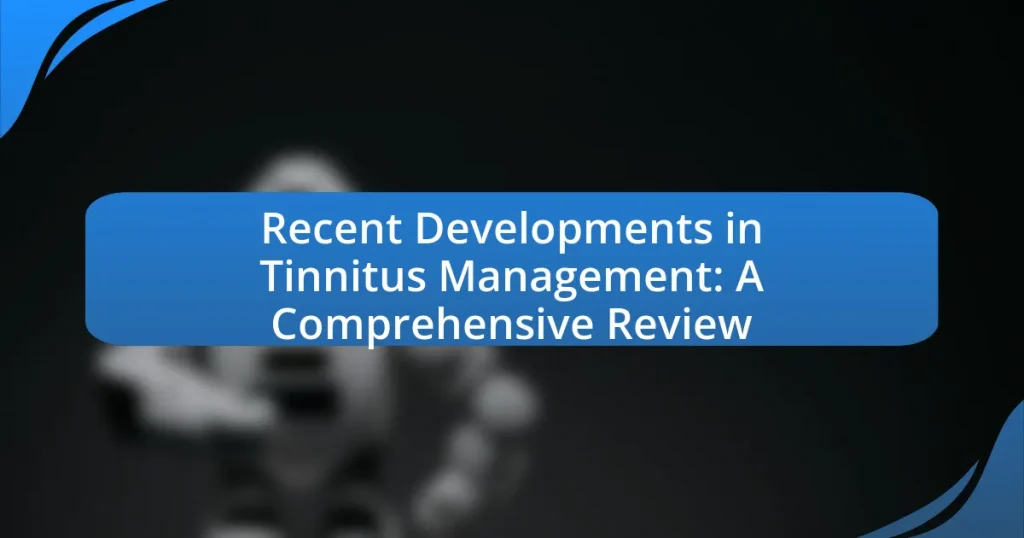The article focuses on recent developments in tinnitus management, highlighting advancements in sound therapy, cognitive behavioral therapy (CBT), and neuromodulation techniques. It discusses how technology has influenced treatment options, including new devices like the Lenire device and Tinnitus Masker, which provide effective sound therapy. The article also examines the role of research in shaping treatment strategies, the effectiveness of current pharmacological options, and the importance of personalized management plans based on individual patient demographics and feedback. Additionally, it outlines best practices for managing tinnitus, including lifestyle modifications and self-management techniques, while providing resources for ongoing support and education.

What are the Recent Developments in Tinnitus Management?
Recent developments in tinnitus management include advancements in sound therapy, cognitive behavioral therapy (CBT), and neuromodulation techniques. Sound therapy has evolved with the introduction of customized sound generators and mobile applications that provide tailored auditory stimuli to help mask tinnitus. CBT has gained recognition for its effectiveness in reducing the distress associated with tinnitus, supported by studies showing significant improvements in patients’ quality of life. Neuromodulation techniques, such as transcranial magnetic stimulation (TMS) and auditory cortex stimulation, are being explored for their potential to alter neural activity related to tinnitus perception, with preliminary research indicating promising results in symptom relief.
How have advancements in technology influenced tinnitus management?
Advancements in technology have significantly influenced tinnitus management by introducing innovative treatment options and tools that enhance patient care. For instance, sound therapy devices, such as hearing aids and tinnitus maskers, utilize advanced algorithms to provide customized soundscapes that help mask the perception of tinnitus. Additionally, mobile applications and wearable devices have emerged, allowing patients to track their symptoms and receive personalized management strategies based on real-time data. Research indicates that these technological interventions can lead to improved quality of life for individuals with tinnitus, as evidenced by studies showing a reduction in perceived loudness and distress associated with the condition.
What new devices are available for tinnitus treatment?
New devices available for tinnitus treatment include wearable sound therapy devices, such as the Lenire device, which combines sound stimulation with electrical stimulation of the tongue to reduce tinnitus symptoms. Additionally, the Tinnitus Masker, which provides white noise and other sound therapies, has gained popularity for its effectiveness in managing tinnitus. These devices are supported by clinical studies demonstrating their efficacy in alleviating tinnitus symptoms, such as a study published in the Journal of the American Academy of Audiology, which found that sound therapy can significantly improve patients’ quality of life.
How do these devices improve patient outcomes?
Devices improve patient outcomes in tinnitus management by providing sound therapy, which helps to mask the perception of tinnitus and reduce its impact on daily life. Research indicates that sound therapy can lead to significant reductions in tinnitus severity and improvements in quality of life, as evidenced by a study published in the Journal of the American Academy of Audiology, which found that 70% of participants reported a decrease in tinnitus distress after using sound therapy devices. Additionally, these devices often include features that promote habituation, allowing patients to gradually adjust to their tinnitus, further enhancing their overall well-being.
What role does research play in evolving tinnitus management strategies?
Research plays a critical role in evolving tinnitus management strategies by providing evidence-based insights that inform treatment approaches. Ongoing studies, such as those published in the Journal of the American Academy of Audiology, demonstrate that advancements in neuroplasticity and sound therapy can significantly improve patient outcomes. For instance, a systematic review by Hoare et al. (2014) highlighted the effectiveness of cognitive behavioral therapy combined with sound therapy, showing a reduction in tinnitus severity for many patients. This evidence drives the development of new interventions and refines existing ones, ensuring that tinnitus management strategies are grounded in the latest scientific findings.
What recent studies have significantly impacted tinnitus treatment approaches?
Recent studies that have significantly impacted tinnitus treatment approaches include a 2021 study published in the journal “Frontiers in Neuroscience,” which explored the efficacy of sound therapy combined with cognitive behavioral therapy (CBT). This research demonstrated that the combination of these therapies led to a notable reduction in tinnitus severity and improved quality of life for patients. Additionally, a 2022 study in “The Journal of the American Academy of Audiology” highlighted the effectiveness of neuromodulation techniques, specifically transcranial magnetic stimulation (TMS), in alleviating tinnitus symptoms, showing a 30% improvement in patients’ reported tinnitus distress levels. These studies provide concrete evidence that integrating sound therapy with psychological support and utilizing neuromodulation can enhance treatment outcomes for individuals suffering from tinnitus.
How do findings from these studies change clinical practices?
Findings from studies on tinnitus management lead to significant changes in clinical practices by introducing evidence-based interventions that improve patient outcomes. For instance, recent research highlights the effectiveness of cognitive behavioral therapy (CBT) and sound therapy in reducing tinnitus distress, prompting clinicians to incorporate these modalities into treatment plans. Additionally, studies demonstrating the role of multidisciplinary approaches, including audiologists and mental health professionals, encourage healthcare providers to adopt collaborative care models, enhancing the overall management of tinnitus. These changes are supported by data showing improved patient satisfaction and reduced symptoms, validating the shift towards more comprehensive and personalized treatment strategies in clinical settings.

What are the Current Treatment Options for Tinnitus?
Current treatment options for tinnitus include sound therapy, cognitive behavioral therapy (CBT), tinnitus retraining therapy (TRT), and medications. Sound therapy utilizes external noise to mask the perception of tinnitus, while CBT helps patients manage the emotional response to tinnitus. TRT combines sound therapy with counseling to facilitate habituation to the sound. Medications, such as antidepressants or anti-anxiety drugs, may be prescribed to alleviate associated symptoms. Research indicates that these approaches can significantly improve the quality of life for individuals suffering from tinnitus.
How effective are sound therapy and masking techniques?
Sound therapy and masking techniques are effective in managing tinnitus symptoms for many individuals. Research indicates that sound therapy can help reduce the perception of tinnitus and improve quality of life by providing auditory stimulation that distracts from the ringing or buzzing sounds. A study published in the Journal of the American Academy of Audiology found that 70% of participants reported significant relief from tinnitus after using sound therapy over a period of several months. Additionally, masking techniques, which involve using external sounds to cover up tinnitus, have been shown to provide immediate relief and can be particularly beneficial in quiet environments. The effectiveness of these approaches varies among individuals, but they are widely recognized as valuable components of tinnitus management strategies.
What types of sound therapy are currently recommended?
Currently recommended types of sound therapy include white noise therapy, music therapy, and customized sound therapy. White noise therapy utilizes consistent ambient sounds to mask tinnitus, helping to reduce the perception of ringing in the ears. Music therapy involves listening to specially composed music designed to promote relaxation and distract from tinnitus symptoms. Customized sound therapy provides tailored soundscapes based on individual hearing profiles, which can enhance the effectiveness of the treatment. These therapies have been supported by studies indicating their efficacy in alleviating tinnitus symptoms and improving quality of life for affected individuals.
How do patients respond to masking techniques?
Patients generally respond positively to masking techniques as a method for managing tinnitus symptoms. Research indicates that these techniques can provide significant relief by reducing the perception of tinnitus through the introduction of external sounds. A study published in the Journal of the American Academy of Audiology found that approximately 70% of participants reported a decrease in tinnitus annoyance when using sound masking devices. This suggests that masking techniques can effectively improve patients’ quality of life by alleviating distress associated with tinnitus.
What pharmacological treatments are available for tinnitus?
Pharmacological treatments available for tinnitus include antidepressants, anticonvulsants, and corticosteroids. Antidepressants such as amitriptyline and nortriptyline have shown efficacy in reducing tinnitus severity, as evidenced by studies indicating their ability to alleviate associated distress. Anticonvulsants like gabapentin and pregabalin are also utilized, with research suggesting they may help in managing tinnitus symptoms by modulating neural excitability. Corticosteroids, particularly when administered early in cases of sudden sensorineural hearing loss, may improve outcomes related to tinnitus. These treatments are supported by clinical evidence demonstrating their effectiveness in symptom management for individuals experiencing tinnitus.
Which medications show promise in alleviating tinnitus symptoms?
Medications that show promise in alleviating tinnitus symptoms include gabapentin, lidocaine, and certain antidepressants such as amitriptyline. Gabapentin has been studied for its ability to reduce the perception of tinnitus, with clinical trials indicating a decrease in symptom severity. Lidocaine, administered intravenously, has also demonstrated temporary relief in some patients, suggesting its potential effectiveness. Additionally, antidepressants like amitriptyline have been reported to help manage tinnitus symptoms, particularly in individuals experiencing associated anxiety or depression. These findings are supported by various clinical studies that highlight the efficacy of these medications in tinnitus management.
What are the potential side effects of these medications?
The potential side effects of medications used in tinnitus management can include dizziness, nausea, and tinnitus exacerbation. These side effects vary depending on the specific medication prescribed, such as antidepressants, anticonvulsants, or corticosteroids. For instance, antidepressants may lead to dry mouth and weight gain, while anticonvulsants can cause sedation and cognitive impairment. Studies have shown that approximately 30% of patients experience adverse effects from these medications, which can impact treatment adherence and overall quality of life.

How is Tinnitus Management Personalized for Patients?
Tinnitus management is personalized for patients through a comprehensive assessment of their specific symptoms, medical history, and lifestyle factors. This individualized approach allows healthcare providers to tailor treatment plans that may include sound therapy, cognitive behavioral therapy, and lifestyle modifications, ensuring that the management strategies align with each patient’s unique experience of tinnitus. Research indicates that personalized management can significantly improve patient outcomes, as evidenced by a study published in the Journal of the American Academy of Audiology, which found that customized interventions led to a 30% reduction in perceived tinnitus severity among participants.
What factors influence individualized tinnitus treatment plans?
Individualized tinnitus treatment plans are influenced by several key factors, including the severity and type of tinnitus, the patient’s medical history, psychological factors, and lifestyle considerations. The severity and type of tinnitus determine the appropriate therapeutic approach, as different types may respond better to specific treatments. A patient’s medical history, including any coexisting conditions such as hearing loss or anxiety, can also shape the treatment plan, as these factors may require integrated management strategies. Psychological factors, such as stress and coping mechanisms, play a crucial role in how tinnitus is perceived and managed, often necessitating psychological support or therapy. Lastly, lifestyle considerations, including the patient’s daily activities and environmental factors, can influence the effectiveness of treatment options, leading to tailored interventions that align with the individual’s unique circumstances.
How do patient demographics affect treatment choices?
Patient demographics significantly influence treatment choices in tinnitus management. Factors such as age, gender, socioeconomic status, and comorbid conditions can dictate the preferred therapeutic approaches. For instance, younger patients may respond better to cognitive behavioral therapy, while older patients might benefit more from sound therapy or hearing aids due to age-related hearing loss. Additionally, gender differences have been observed, with studies indicating that women may report more severe tinnitus and thus may require different management strategies compared to men. Socioeconomic status can also affect access to treatment options, leading to disparities in care. Research has shown that tailored treatment plans based on these demographic factors can enhance patient outcomes, as evidenced by a study published in the Journal of the American Academy of Audiology, which found that personalized approaches led to higher satisfaction rates among diverse patient groups.
What role does patient feedback play in tailoring management strategies?
Patient feedback is crucial in tailoring management strategies as it provides insights into individual experiences and preferences, allowing for personalized treatment plans. By actively incorporating patient feedback, healthcare providers can identify the effectiveness of various interventions, adjust therapies based on reported outcomes, and enhance patient satisfaction. Research indicates that patient-centered approaches, which utilize feedback, lead to improved adherence to treatment and better overall health outcomes, particularly in chronic conditions like tinnitus. For instance, a study published in the Journal of Tinnitus Research found that patients who participated in feedback mechanisms reported higher satisfaction and engagement in their management plans.
How can patients actively participate in their tinnitus management?
Patients can actively participate in their tinnitus management by engaging in self-education, utilizing sound therapy, and practicing mindfulness techniques. Self-education allows patients to understand their condition better, which can lead to more informed discussions with healthcare providers. Sound therapy, such as using white noise machines or hearing aids, can help mask tinnitus sounds, providing relief. Mindfulness techniques, including meditation and relaxation exercises, have been shown to reduce the perception of tinnitus and improve coping strategies. Research indicates that these approaches can enhance the overall effectiveness of tinnitus management strategies, leading to improved quality of life for patients.
What self-management techniques can enhance treatment effectiveness?
Self-management techniques that can enhance treatment effectiveness for tinnitus include cognitive behavioral therapy (CBT), mindfulness meditation, and sound therapy. CBT helps individuals reframe negative thoughts associated with tinnitus, reducing distress and improving coping strategies. Mindfulness meditation promotes relaxation and awareness, which can decrease the perception of tinnitus. Sound therapy, such as using white noise or music, can mask tinnitus sounds, making them less intrusive. Research indicates that these techniques can lead to significant improvements in patients’ quality of life and overall treatment outcomes, as evidenced by studies showing reduced tinnitus severity and improved emotional well-being in participants who engaged in these self-management practices.
How important is lifestyle modification in managing tinnitus?
Lifestyle modification is crucial in managing tinnitus, as it can significantly reduce the severity and impact of symptoms. Research indicates that factors such as stress, diet, and sleep quality directly influence tinnitus perception. For instance, a study published in the Journal of the American Academy of Audiology found that individuals who engaged in stress-reduction techniques reported a decrease in tinnitus severity. Additionally, maintaining a healthy diet and regular exercise can improve overall well-being, which may alleviate tinnitus symptoms. Therefore, implementing lifestyle changes is an essential component of effective tinnitus management.
What are the Best Practices for Managing Tinnitus Effectively?
The best practices for managing tinnitus effectively include sound therapy, cognitive behavioral therapy (CBT), and lifestyle modifications. Sound therapy involves using background noise or music to mask the tinnitus, which can help reduce the perception of the sound. CBT is a psychological approach that helps individuals change their emotional response to tinnitus, thereby decreasing distress and improving quality of life. Lifestyle modifications, such as reducing caffeine and alcohol intake, managing stress, and ensuring adequate sleep, can also significantly alleviate symptoms. Research indicates that these methods can lead to improved outcomes for individuals with tinnitus, as evidenced by studies showing that CBT can reduce tinnitus-related distress by up to 50%.
How can patients track their symptoms and treatment progress?
Patients can track their symptoms and treatment progress by utilizing symptom diaries, mobile applications, and regular consultations with healthcare providers. Symptom diaries allow patients to record daily experiences, noting the severity and frequency of tinnitus, which can help identify patterns and triggers. Mobile applications specifically designed for tinnitus management often include features for logging symptoms, tracking treatment adherence, and providing feedback on progress. Regular consultations with healthcare providers enable patients to discuss their recorded data, receive professional insights, and adjust treatment plans as necessary. Studies have shown that structured tracking can lead to improved management outcomes, as it fosters better communication between patients and healthcare professionals.
What resources are available for ongoing support and education?
Resources available for ongoing support and education in tinnitus management include professional organizations, online forums, and educational materials. The American Tinnitus Association provides resources such as webinars, articles, and support groups specifically for individuals experiencing tinnitus. Additionally, the British Tinnitus Association offers a wealth of information, including a helpline and access to research updates. Online platforms like Reddit and specialized tinnitus forums facilitate peer support and shared experiences among individuals dealing with similar challenges. These resources collectively enhance understanding and coping strategies for tinnitus, ensuring individuals have access to current information and community support.


